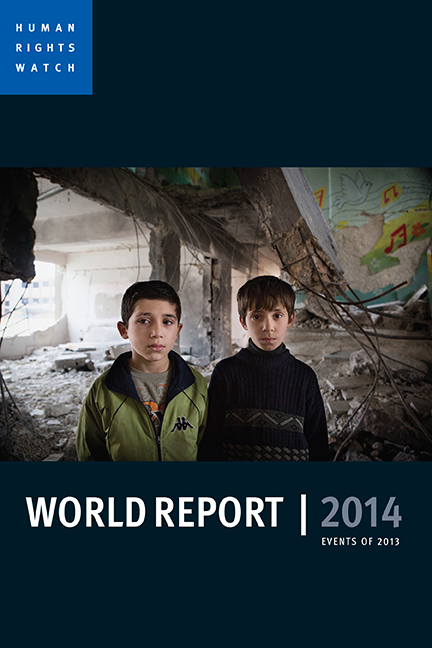Book contents
- Frontmatter
- Dedication
- HUMAN RIGHTS WATCH
- Table of Contents
- Foreword
- Rights Struggles of 2013: Stopping Mass Atrocities, Majority Bullying, and Abusive Counterterrorism
- The Human Rights Case for Drug Reform How Drug Criminalization Destroys Lives, Feeds Abuses, and Subverts the Rule of Law
- Putting Development to Rights: Integrating Rights into a Post-2015 Agenda
- The Right Whose Time Has Come (Again) Privacy in the Age of Surveillance
- Photo Essays
- AFRICA
- AMERICAS
- ASIA
- EUROPE AND CENTRAL ASIA
- MIDDLE EAST AND NORTH AFRICA
- UNITED STATES AND CANADA
- 2013 HUMAN RIGHTS WATCH PUBLICATIONS
- Acknowledgments
- Frontmatter
- Dedication
- HUMAN RIGHTS WATCH
- Table of Contents
- Foreword
- Rights Struggles of 2013: Stopping Mass Atrocities, Majority Bullying, and Abusive Counterterrorism
- The Human Rights Case for Drug Reform How Drug Criminalization Destroys Lives, Feeds Abuses, and Subverts the Rule of Law
- Putting Development to Rights: Integrating Rights into a Post-2015 Agenda
- The Right Whose Time Has Come (Again) Privacy in the Age of Surveillance
- Photo Essays
- AFRICA
- AMERICAS
- ASIA
- EUROPE AND CENTRAL ASIA
- MIDDLE EAST AND NORTH AFRICA
- UNITED STATES AND CANADA
- 2013 HUMAN RIGHTS WATCH PUBLICATIONS
- Acknowledgments
Summary
Canada enjoys a global reputation as a defender of human rights at home and abroad that reflects a solid record on core civil and political rights protections, and a generally progressive approach to economic and social rights. Nonetheless, serious human rights concerns demand remedial action by federal and provincial governments, particularly with regard to the rights of the indigenous peoples of Canada, people impacted abroad by Canada's extractive industries, and ethnic and religious minorities in Quebec. Recent federal government actions undermining the ability of civil society organizations to engage in advocacy impede progress on a range of human rights issues.
Violence against Indigenous Women and Girls
In February 2013, the federal government established an all-party committee in Canada's House of Commons to hold hearings on the issue of missing and murdered indigenous women and to propose solutions to address root causes of violence. The committee made limited progress and was criticized by missing women advocates for lacking clear direction, prioritizing government witnesses over victims’ family members, and failing to consider alternative, culturally sensitive methods of family and community participation.
The Native Women's Association of Canada has documented 582 cases of missing and murdered indigenous women and girls in Canada as of March 2010. Many of the killings and disappearances were between the 1960s and the 1990s, but 39 percent occurred after 2000. The number of cases is undoubtedly higher today, but comprehensive data is not available since the government cut funding for the organization's database, and police forces in Canada do not consistently collect race and ethnicity data.
In February, Royal Canadian Mounted Police (RCMP) Commissioner Bob Paulson told his officers via email, “Don't worry about it, I’ve got your back,” in response to a 2013 Human Rights Watch report documenting the RCMP's failure in British Columbia (BC) to protect indigenous women and girls from violence, as well as abusive police behavior against indigenous women and girls, including excessive use of force, and physical and sexual assault. Canada has inadequate police complaint mechanisms and oversight procedures, including a lack of a mandate for independent civilian investigations into all reported incidents of serious police misconduct.
In February 2013, the federal government referred Human Rights Watch's report on police mistreatment of indigenous women and girls in BC to a complaints commission for investigation.
- Type
- Chapter
- Information
- World Report 2014Events of 2013, pp. 636 - 641Publisher: Bristol University PressPrint publication year: 2014

